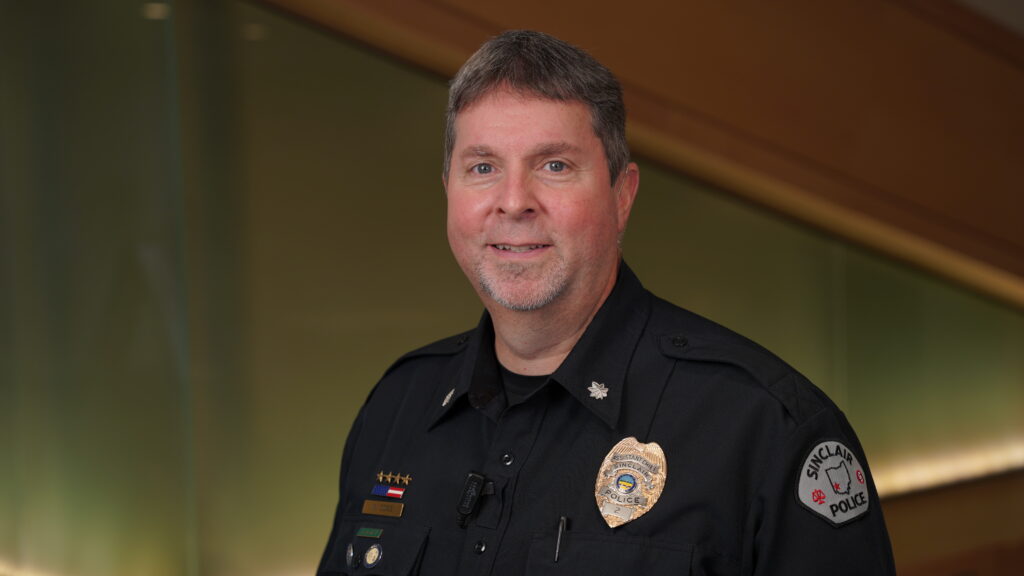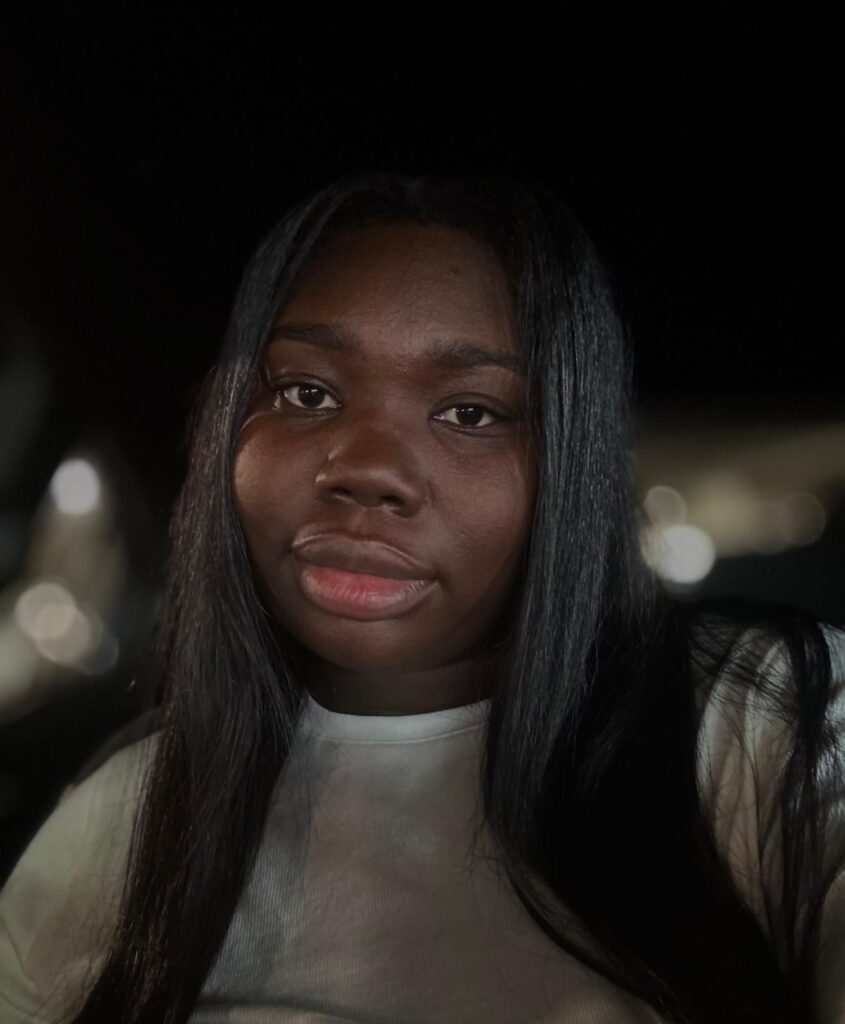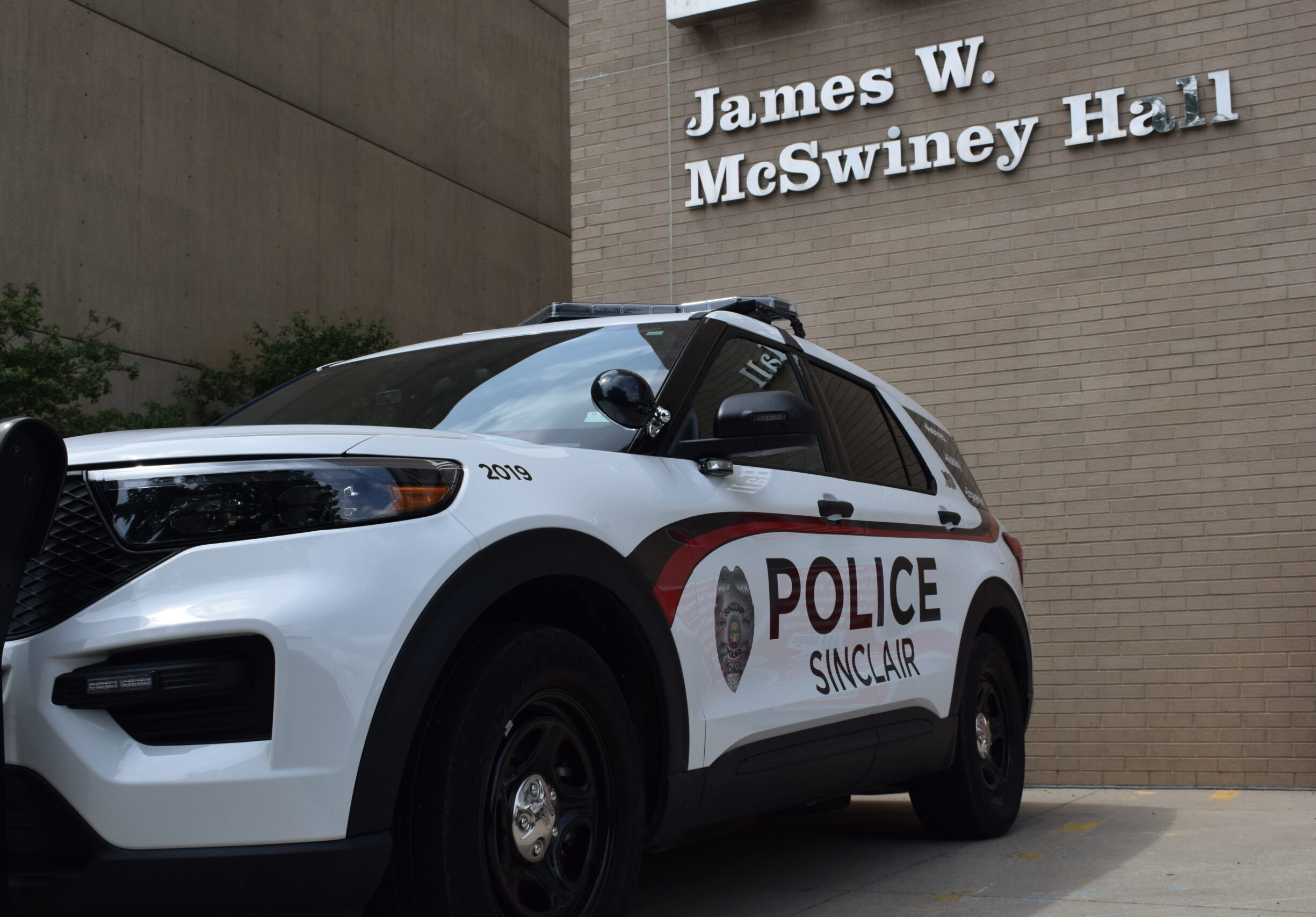The goal of any school is for students to attend all their classes and return home without worrying about the danger of having an educational institution without security.
This is the reality of Sinclair College, thanks to the dedication of the Department of Public Safety. However, in a city that is not exempt from violence, Sinclair is also vulnerable to crimes being committed on campus.
Many students are unaware of what the Sinclair Police can and cannot do or the types of crimes that happen on campus. As the school year comes to a close, it is time to shed some light on what the Sinclair police do for the campus community.
According to Michael Coss, the new chief of police, theft is the most common crime at the Dayton campus. As an open campus, anyone can enter any building without checking in at the door without any credentials.
He went on to say that there are doors here at Sinclair with a card reader at the doors and only those allowed to go through these doors with their cards can enter. He also advised not to leave any belongings out or unsecured, under any circumstances, since the campus is open to everyone.
Coss encourages everyone who comes to the campus to take care of their belongings and ensure someone is watching them when they leave their spot to go somewhere or get something.
While theft is the most common crime on campus, other crimes are also committed here, but are rare.
“We have had assaults on campus. Any drugs that we’ve ever been involved with are usually folks that are not tied to the campus,” Coss said.
According to the Sinclair Police Monthly Incident Reports and Coss, crime statistics from 2023-24 decreased by 9%. Four felonies and 30 misdemeanors were committed in 2023, and two felonies and 29 misdemeanors were committed on the Dayton campus in 2024. Some of these misdemeanors resulted in charges filed in the Dayton Municipal Court.
Between 2023 and 2024, 17 arrests were made; most were for criminal trespass, drug possession, and theft. The pattern was that almost all the arrested people were non-students on the campus and around the Sinclair property.
To handle incidents on campus properly, the Sinclair Police Department has put in place a number of policies and procedures, aligning them with the best practices in campus safety.
They do their best to ensure that everyone involved is well taken care of, listened to and investigated thoroughly before making a final decision. A great example of this is how they respond to emergencies.

“We could have different responses depending on that situation. So, like today, we got someone who had possibly injured themselves or sustained an illness. Well, we’re going to respond to that as quickly as possible because if that person needs some sort of medical attention, we can help facilitate that,” Coss said.
In addition to their response to incidents, in January this year, there was a Sinclair employee who was harassed through texting by a non-student acquaintance and the Sinclair Police handled it as expected; allegations of stalking-related harassment, extortion, and threats will be made to the Montgomery County Prosecutors’ office.
Sinclair Police are also involved with some groups in the Dayton community. According to an article in The Clarion about Coss becoming the new chief of police, they partner with organizations such as the Montgomery County ID drive and the Dayton Boys and Girls Club (BGCD).
They also do their best to ensure that students new to the United States and its culture are well educated on how law enforcement works and unfamiliar things. They collaborate with the student counselling services to ensure that students are well taken care of physically and mentally and also with Transition Option in Post-Secondary Education (TOPS) through the recently added Blue Envelope program.
The Sinclair Police may seem upright based on their records and dedication to serving the campus community. However, how the campus community perceives them can either validate their efforts or raise questions. Therefore, reaching out to this community was the right approach to learn more; a student answered questions about the Sinclair Police.
“I feel very safe on campus and the reason why is because we have police always running around. They’re always doing their laps around and we have a lot of cameras as well; it does help out a lot. I like to see when I come on campus to see that there’s Sinclair police parked outside and they are very vigilant and I like that about them,” Azaria Moultrie, a nursing major, said.
She went on to say that she had interacted with several police officers, especially Piper’s handler, Matthew Tyahur, a member of the Sinclair Police.
Piper is the community support dog that was recently added to the public safety department. According to a post on Sinclair’s Facebook page, out of 147 dogs that were in training, he is the youngest dog to complete the program in 5 and a half months; and he is now certified in obedience training, good citizen, advanced canine good citizen and urban canine good citizen.
“I have had interactions with them when they have their tables set up or when they’re like patrolling sound. They always ask how I’m doing, how’s my day going, if there’s anything I need. You know, they make sure I’m aware of different resources that they offer, and different resources that Sinclair offers,” Moultrie said.

Even though Moultrie hasn’t had any reason to use the Sinclair Police’s resources, she recommends them to any students who find themselves in a situation that requires the police’s presence or what they offer.
“The only resource I use is Piper. So you pet him. I pet Piper and feel like 10 times better for the next 10 months, I promise,” Moultrie said.
Moultrie said the Sinclair police are actively engaging with the student body. She mentioned that a guy kept coming around the library last semester and she reported him.
“He was being weird. So, I went and made them aware of him, gave them his description and they were on it and since I made that complaint that day, I haven’t seen him on campus… They nipped it in the bud. They were quick, they were efficient and they were quiet about it. They made sure that he never came back,” Moultrie said.
She went on to say that since then, she hasn’t seen anyone creeping around the library or the parking garage. The presence of the Sinclair Police greatly impacts students’ feelings of safety on campus.
This indicates that not only do the police provide a physical sense of safety, but the emotional support they offer through resources like Piper also helps to create a more positive and reassuring campus atmosphere.
Regarding complaints from other students regarding the police department, Moultrie said that she hasn’t heard anything bad about the department, not even from faculty members.
When it comes to whether or not the Sinclair Police hold events that allow them to engage with students, Coss said that they mostly attend events held by other organizations and departments when they plan events for student engagement.
The Sinclair Police held only about three to four this spring semester, including the Coffee with the Cop event; however, they are available to answer any questions that students and staff have about their job and all that has to do with being a Police officer here at Sinclair.
Just like any other school police, the Sinclair Police has a jurisdiction within which it is allowed to operate.
According to Coss, the Sinclair Police have jurisdiction over Sinclair property and adjacent areas. They have a Memorandum of Understanding with the Dayton Police Department that allows them to take enforcement action within the city limits. Still, they do not patrol outside or off their property.
There also exists a Memorandum of Understanding for all of Montgomery County for Sinclair Police to respond in emergencies.
In conclusion, the Sinclair Police are part of the reason the campus is safe for students, faculty and visitors; this is shown in their response to emergencies on campus, engagement with the campus and Dayton communities and all the collaborations they have in place.
Esperance Amuri, staff writer
Check out more posts by the Clarion:
- A look inside Sinclair Police’s dedication to campus safety
- Tech Prep Consortium helps high school students get a head start at Sinclair
- New Blood, New Glory: The Next Generation Takes Center Stage in NBA Finals
- Your Voice: Students share their thoughts about online classes
- 7 Underrated Programs at Sinclair College

